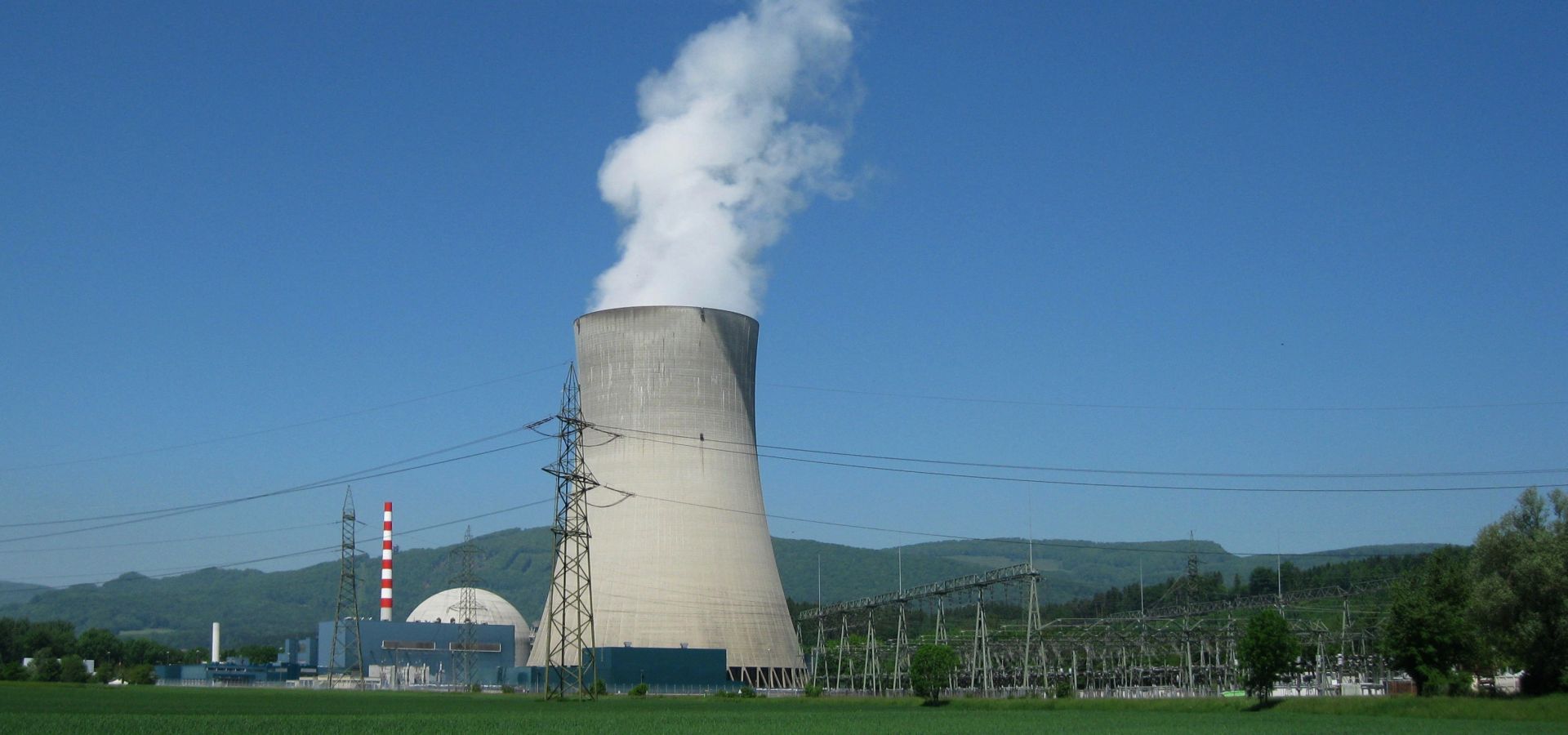The operator of Switzerland’s nuclear reactors, Alpiq, reportedly offered reactors to France’s EDF at no cost or “a symbolic franc.” The French, who have their hands full with their own struggling fleet at home, refused the offer. A potential power shortfall still looms in the background. Craig Morris explains.

Gösgen Nuclear Power Plant, Switzerland (Photo by Ch-info.ch, edited, CC BY-SA 1.0)
On the weekend, Swiss media reported (in German and in French) that Swiss reactor operator Alpiq could find no buyer for its two nuclear plants and is therefore hoping to give them to the Swiss state. The firm’s CEO is quoted saying that France’s EDF was not interested even at no cost because it “has its own problems pertaining to nuclear power at present.”
It is possible that the announcement is a bargaining chip just in case the Swiss decide in their referendum later this month to phase out nuclear. Alpiq’s Gösgen reactor would then have to close in 2024; Leibstadt, in 2029. The company may thus be looking for ways to ask for money from the Swiss state in return for a closure. At present, the firm is apparently losing 2 billion francs annually but can only pass on half of those losses to consumers.
Oddly, neighboring France faces a power shortage that should lead to greater demand in Switzerland; the aforementioned losses have been part of a longer trend stemming back to the solar boom of Germany (see my report from 2012), which began bringing down prices on spot power markets despite Chancellor Merkel’s nuclear phaseout of 2011. Solar and wind have simply grown faster than anyone expected.
As I recently explained, France has more than a third of its reactors closed at present. At the beginning of November, it was announced (in French) that five of the 20 reactors (out of 58) currently undergoing inspections would not come back online this month as expected.
Concerns of a power shortage also extend to the UK, where system operator National Grid warned of a potential shortfall on Monday, November 07. Power prices have reached as high as 40 pence on the spot market, whereas 4 pence would be more usual (play around with this table). The British were importing power full blast on line from the Netherlands and France, thereby contributing to the drain on French supply.
As a result, French prices were also high that Monday, reaching nearly 40 cents. But that’s nothing: a power trader says it is “almost certain” that France will reach its price cap of three euros per kilowatt-hour on the exchange this winter. The head of EDF, which operates all of France’s reactors, has now said that the danger of a blackout this winter is real (in French). At that point, France might import from the UK no matter what the cost, and the British would fire up their strategic reserve.
On Sunday, November 6, France was still a net exporter to most neighbors, except Germany. Between those two countries, power lines were maxed out as France imported as much electricity as it could from the Germans most of the time. Power prices on the exchange were thus unaligned, with the French easily paying 10 percent more, but up to 50 percent more during the evening, when demand peaks.
This phase could be temporary (until the spring) for the French, but only if they can get reactors back online. On the other hand, the country aims to reduce the share of nuclear from 75 to 50 percent by 2025, so the current situation shows what that future would look like if replacement capacity is not built. And in case you are thinking they should build solar and wind: the sun does not shines in these winter hours of peak demand, and the shortfall in production in the UK coincided with low wind power production. The one country that looks good in Germany, where a broad bouquet of power sources—nuclear, coal, gas, and renewables—are online. And the share of renewables almost never drops below 20 percent in Germany.
The problem is thus that France and the UK have failed to build enough renewables, especially biogas plants running on waste (which are dispatchable), while they wasted time hoping to build nuclear plants that never emerged. As for the Swiss, well, they have suffered from the same indecision but may set it aside finally in their referendum on November 27.
Craig Morris (@PPchef) is the lead author of German Energy Transition. He is co-author of Energy Democracy, the first history of Germany’s Energiewende, and is currently Senior Fellow at the IASS.
Neither France nor the UK are yet putting serious money into expanding their pumped hydro capacity. This stuff has a long lead time, as you have to build in scenic mountains and overcome NIMBY opposition (more justified than with onshore wind). Undersea cables to Norway and Iceland face no such obstacles.
EDF asphyxiated by nuclear:
http://bourse.lefigaro.fr/indices-actions/actu-conseils/edf-asphyxie-par-le-nucleaire-selon-greenpeace-5924571
machine translation:
https://translate.google.com/translate?hl=en&sl=fr&tl=en&u=http%3A%2F%2Fbourse.lefigaro.fr%2Findices-actions%2Factu-conseils%2Fedf-asphyxie-par-le-nucleaire-selon-greenpeace-5924571
Dutch try to give away atom power plant “Borssele” for free – no one wants it:
In short: Delta, the owner of Borssele, tried to ‘sell’ the plant without success.
Delta called on the government to bail it out but the government is only willing to give a loan guarantee securded by the healthy parts of Delta(mainly the power distribution and water business).
Delta says that this makes no sense to them, they would bankrupt.
https://www.nrc.nl/nieuws/2016/11/17/aandeelhouders-delta-zien-niets-in-reddingsplan-minister-a1532217
Machine translation:
https://translate.google.com/translate?sl=nl&tl=en&js=y&prev=_t&hl=en&ie=UTF-8&u=https%3A%2F%2Fwww.nrc.nl%2Fnieuws%2F2016%2F11%2F17%2Faandeelhouders-delta-zien-niets-in-reddingsplan-minister-a1532217&edit-text=
See also:
http://www.pzc.nl/regio/zeeuws-nieuws/overleg-tussen-rijk-en-zeeland-over-kerncentrale-borssele-is-vastgelopen-1.6651673
Machine translation:
https://translate.google.com/translate?sl=nl&tl=en&js=y&prev=_t&hl=en&ie=UTF-8&u=http%3A%2F%2Fwww.pzc.nl%2Fregio%2Fzeeuws-nieuws%2Foverleg-tussen-rijk-en-zeeland-over-kerncentrale-borssele-is-vastgelopen-1.6651673&edit-text=
EdF-France in a similar situation – only the closure of loss-making atom power plants could keep the company afloat:
http://www.capital.fr/bourse/interviews/avec-un-deficit-de-provisions-d-au-moins-50-milliards-le-nucleaire-va-t-il-couler-edf-1186052
Machine translation:
https://translate.google.com/translate?hl=en&sl=fr&tl=en&u=http%3A%2F%2Fwww.capital.fr%2Fbourse%2Finterviews%2Favec-un-deficit-de-provisions-d-au-moins-50-milliards-le-nucleaire-va-t-il-couler-edf-1186052
So we see in 4 countries grid connected with each other the atom power being a publicly recognized financial disaster : France,the Netherlands, Germany and Sweden. Sweden’s Vattenfall is closing down some of the power plants as Germany as well.